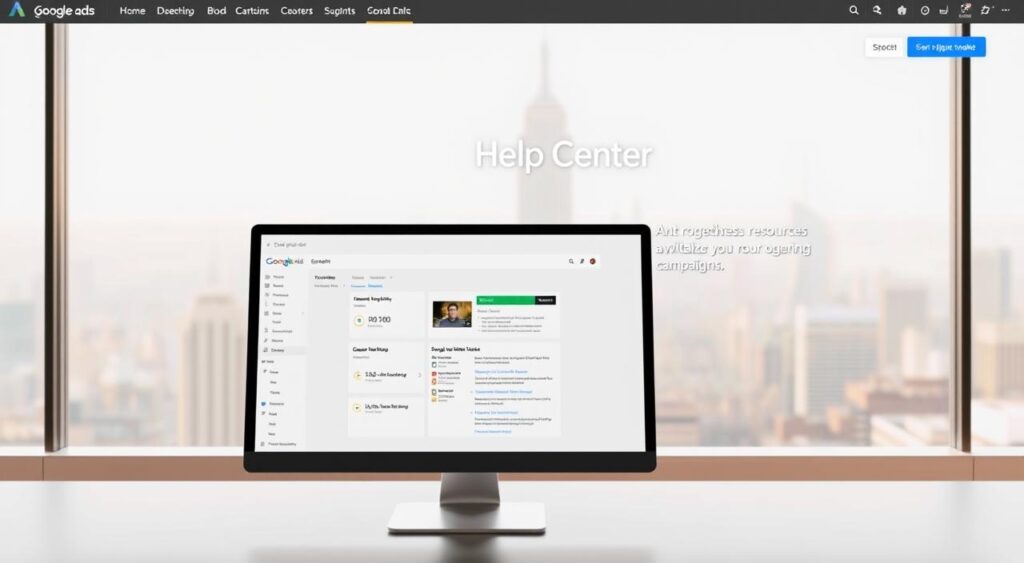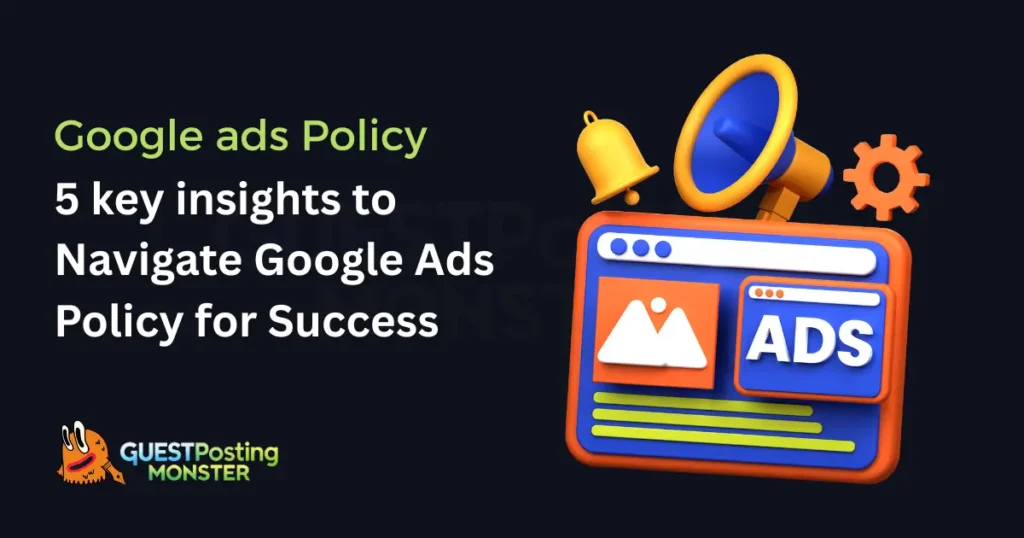Google Ads Policy plays a crucial role in maintaining a fair and transparent advertising ecosystem. By setting clear guidelines, it ensures that all advertisers adhere to ethical standards, deliver truthful content, and provide users with a safe browsing experience. Understanding and complying with Google Ads Policy not only helps businesses avoid account suspensions but also enhances ad performance and builds long-term trust with their audience.
Understanding these policies is essential for advertisers to avoid potential pitfalls, such as ad disapproval or account suspension. By familiarizing themselves with the key areas of these policies, advertisers can create compliant and effective ad campaigns that drive results.
Effective campaign management involves staying informed about the latest advertising policies and best practices. This knowledge enables advertisers to navigate the confusing landscape of online advertising with confidence.
Google Ads Policy: The Foundation of Trustworthy Advertising
The Google Ads Policy sets the standards for ethical, transparent, and effective advertising. By understanding and following these guidelines, businesses can avoid ad disapprovals, enhance campaign performance, and build lasting trust with their audience.
Understanding Google Ads Policies
Effective Google Ads campaigns are built on a foundation of compliance with Google’s advertising guidelines. Google designs these policies to safeguard users and guarantee a secure and enjoyable experience on the platform.
What Are Google Ads Policies?
Google Ads policies are comprehensive guidelines that govern various aspects of advertising on the Google Ads platform. They cover a wide range of topics, from the types of content allowed in ads to the technical requirements for ad creatives.
These policies prohibit content that is harmful or inappropriate, including counterfeit goods, dangerous products, and hate speech. By establishing clear rules, Google aims to maintain a trustworthy environment where users can confidently engage with ads.
Advertisers must familiarize themselves with these policies to avoid potential pitfalls and ensure their campaigns run smoothly.
Why Compliance is Essential
Compliance with Google Ads policies is not just a necessity; it’s a strategic advantage. By adhering to these guidelines, advertisers can maintain a positive brand reputation and maximize their return on investment (ROI).
Understanding and adhering to Google Ads policies helps advertisers create effective ad campaigns that drive results. Non-compliance, on the other hand, can lead to penalties, including ad disapproval or even account suspension.
It’s crucial for advertisers to stay informed about the latest policy updates and adjustments to ensure ongoing compliance.
- Ensures a safe and positive user experience
- Protects against ad fraud and malicious activities
- Helps maintain a positive brand reputation
- Maximizes ROI by avoiding penalties
Key Policy Areas in Google Ads
To run successful campaigns, advertisers must understand the key policy areas in Google Ads. Google Ads policies cover four broad areas: prohibited content, prohibited practices, restricted content, and editorial and technical requirements. Advertisers must comply with these policies to avoid ad disapproval or account suspension.
Types of Ads Covered
Google Ads policies govern various types of ads, including text, image, and video ads. The policies cover prohibited content, such as counterfeit goods and hate speech, as well as restricted content, like alcohol and gambling ads. Advertisers must ensure that their ads comply with these policies to avoid any issues.
Restricted Content and Advertisements
Restricted content includes ads that are subject to certain requirements or limitations, such as ads for alcohol, gambling, and healthcare services. Advertisers must carefully review the policies related to these areas to ensure compliance. For instance, ads for alcohol must target the appropriate audience and comply with local laws.
- Ensure ads comply with Google Ads policies.
- Review restricted content policies carefully.
- Comply with editorial and technical requirements.
By understanding and complying with Google Ads policies, advertisers can create successful campaigns that reach their target audience effectively.
Common Google Ads Policy Violations
Understanding the intricacies of Google Ads policies is crucial for advertisers to avoid policy violations. Google Ads has a complex set of rules that advertisers must comply with to ensure their ads are approved and visible to their target audience.
Prohibited Practices
Google Ads policies strictly prohibit certain practices. These include:
- Cloaking: Displaying content to users that differs from what Google’s crawlers see.
- Arbitrage: Redirecting users to a different page than the one they clicked on.
- Misleading Claims: Making false or misleading claims about a product or service.
Engaging in these prohibited practices can result in ad disapproval or even account suspension. Advertisers must ensure their ads comply with Google Ads policies to avoid these penalties.
Avoiding Banned Keywords
Google Ads has a list of banned keywords that advertisers must avoid using in their ad campaigns. These keywords include those related to prohibited content, such as
- Illicit substances
- Counterfeit goods
- Unauthorized intellectual property
To avoid using banned keywords, advertisers should carefully review Google’s policy guidelines and ensure their ad copy and targeting comply with these rules.

By understanding and complying with Google Ads policies, advertisers can create successful ad campaigns that reach their target audience effectively.
Creating Compliant Ads
Understanding and implementing Google Ads policies is vital for advertisers aiming to create compliant and effective ads. Advertisers must navigate the confusing landscape of online advertising regulations to ensure their ads reach the target audience without violating advertising policies.
Best Practices for Ad Creation
Creating compliant ads requires a profound understanding of Google Ads policies and best practices for ad creation. Advertisers should focus on ensuring ad relevance, using clear and concise language, and avoiding misleading claims. As Google emphasizes, “Ads should be relevant to the user’s search query and provide a clear solution to their needs.”
“The key to successful ad creation is understanding your audience and crafting ads that resonate with them.”
To achieve this, advertisers can follow several best practices:
- Use clear and concise language in ad copy.
- Ensure ad relevance by targeting specific keywords.
- Avoid misleading claims by being transparent about products or services.
Proper Targeting Techniques
Proper targeting techniques are crucial for improving ad performance and driving results. Advertisers can use location targeting to reach users in specific geographic locations and audience targeting to reach users based on their interests and behaviors.
By leveraging these targeting techniques, advertisers can increase the effectiveness of their ads and improve their return on investment (ROI). As noted by industry experts, “Targeting the right audience is key to maximizing ad performance.”
Ad Review and Approval Process
Understanding the ad review and approval process is vital for advertisers using Google Ads. This process ensures that all ads comply with Google Ads policies, maintaining a safe and relevant advertising environment.
Google Ads uses a combination of automated systems and human review to evaluate ads for policy compliance. This dual approach allows for efficient processing while ensuring that complex ad cases are handled appropriately.
How Ads Are Reviewed
The review process involves checking ads against Google Ads policies, which cover a wide range of aspects, including content, targeting, and landing page quality. Ads that do not comply with these policies may be rejected or require modifications.
Key aspects reviewed during the ad approval process include:
- Ad content and messaging
- Targeting options and audience settings
- Landing page quality and relevance
- Compliance with Google Ads policies
As emphasized by Google, “Our policies are in place to ensure a safe and relevant advertising environment.” Ensuring compliance with these policies is crucial for the success of your ad campaigns.
Understanding Ad Approval Timelines
Advertisers can expect varying approval timelines depending on the complexity of their ads. Simple ads that clearly comply with Google Ads policies can be approved quickly, often within a few hours.
More complex ads, or those that require additional review, may take longer to be approved. Factors that can influence approval time include the need for human review or additional information from the advertiser.
To manage expectations and plan your campaigns effectively, it’s essential to understand that ad approval times can vary.
Appeals Process for Rejected Ads
The appeals process for rejected ads is a vital step for advertisers to rectify policy violations and successfully reinstate their ads. Understanding this process is crucial for advertisers who want to resolve issues and continue their advertising campaigns without significant interruptions.
Filing an Appeal
To file an appeal for a rejected ad, advertisers must follow Google Ads’ structured appeals process. This involves:
- Reviewing the policy violation notification to understand the reason for the rejection.
- Gathering relevant information and documentation that supports the appeal.
- Submitting the appeal through the Google Ads interface, providing a clear explanation for why the ad should be approved.
Tips for a Successful Appeal
Ensuring a successful appeal requires careful preparation and a thorough understanding of Google Ads’ policies. Here are some tips:
- Ensure Ad Compliance: Review your ad against Google Ads’ policies to ensure it complies with all guidelines.
- Provide Clear Explanations: In your appeal, clearly illustrate why you believe your ad should be approved, addressing the specific policy violation.
- Support Your Appeal: Include any relevant documentation or evidence that supports your appeal.
By following these steps and tips, advertisers can effectively navigate the appeals process and increase their chances of a successful outcome.
Understanding and utilizing the appeals process effectively is key to maintaining a successful Google Ads campaign. Advertisers must stay informed about Google Ads’ policies and adapt their strategies accordingly to minimize the risk of ad rejection.
Monitoring and Reporting Violations
To maintain compliant ad campaigns, advertisers need to stay vigilant and monitor their ads closely. Google Ads provides several tools and features to help advertisers track their policy compliance and report suspicious ads.
Tools for Tracking Policy Compliance
Advertisers can utilize Google Ads’ Policy Manager to track policy compliance. This tool helps identify potential policy violations before they become major issues. Additionally, advertisers can leverage other features such as
- Ad preview tools to check how ads appear to users
- Performance reports to monitor ad performance and identify potential issues
- Alerts and notifications for policy compliance and ad performance
By using these tools, advertisers can proactively manage their ad campaigns and ensure they remain compliant with Google Ads policies.
Reporting Suspicious Ads
If advertisers come across ads that violate Google Ads policies or are suspicious in nature, they can report these ads using Google’s reporting tools. Reporting suspicious ads helps maintain the integrity of the Google Ads ecosystem.
The process involves:
- Identifying the ad that violates Google Ads policies
- Using the reporting tool provided within Google Ads to submit the ad for review
- Providing details about why the ad is being reported
Regular monitoring and reporting are vital to maintaining a compliant and effective ad campaign. By staying informed and using the available tools, advertisers can navigate Google Ads policies with confidence.
For more information on Google Ads policies and compliance, advertisers can refer to the Google Ads Help Center and other educational resources provided by Google.
Ad Performance and Policy Compliance
Advertisers must navigate the complexities of Google Ads policies to optimize ad performance. Ensuring that ads comply with Google’s policies is critical to sustaining a successful campaign.
Impact of Policy Violations on Metrics
Policy violations can have a significant negative impact on ad performance metrics, including click-through rates and conversion rates. When an ad violates Google Ads policies, it can lead to:
- Reduced visibility due to disapproval or limited ad serving
- Lower click-through rates as a result of ad disapproval or warning messages
- Decreased conversion rates due to the loss of potential customers
Understanding these impacts is essential for advertisers to adjust their strategies accordingly.
Adjusting Strategies Based on Feedback
To maintain optimal ad performance, advertisers must be prepared to adjust their strategies based on feedback from Google Ads. This includes:
- Reviewing ad performance data to identify areas for improvement
- Adjusting ad targeting to ensure compliance with Google Ads policies
- Modifying ad creatives to align with policy requirements
As noted by Google Ads experts, “Continuous monitoring and adaptation are key to successful campaign management.” By staying informed and adapting to policy changes and feedback, advertisers can ensure their campaigns remain compliant and effective.
“The key to successful Google Ads management is not just about complying with policies but also about understanding how these policies impact your ad performance.”
Resources for Marketers
To navigate the confusing world of Google Ads, marketers need access to reliable resources. Google Ads offers a variety of tools and information to help advertisers stay informed about policy updates and best practices.
Google Ads Help Center Overview
The Google Ads Help Center is a comprehensive resource that provides detailed information on Google Ads policies, including advertising policies and online advertising regulations. It offers guides, troubleshooting tips, and best practices for creating compliant ads.
Marketers can find information on various topics, including ad formats, targeting options, and budgeting strategies. The Help Center also includes a section dedicated to policy updates, ensuring that advertisers stay informed about changes that may impact their campaigns.

Educational Material and Webinars
Google Ads also provides educational materials and webinars to help marketers strengthen their skills and stay up-to-date with the latest trends and best practices. These resources cover a range of topics, from campaign setup to advanced optimization techniques.
By leveraging these resources, marketers can learn more about Google Ads policies and how to create effective, compliant campaigns. This knowledge can help advertisers achieve better results and maximize their return on investment.
Some of the benefits of using Google Ads resources include:
- Improved knowledge of Google Ads policies and best practices
- Enhanced campaign performance through optimized ad targeting and budgeting
- Better compliance with online advertising regulations, reducing the risk of policy violations
Staying Updated on Policy Changes
Maintaining compliant and effective ad campaigns requires staying informed about updates to Google Ads policies. Advertisers must be aware of changes to ad policies to ensure their campaigns continue to meet the required standards.
Regular Checks for Updates
Regularly checking for updates is crucial for advertisers to adjust their strategies and maintain compliance with Google Ads policies. This proactive approach helps prevent potential issues that could arise from policy changes.
Resources for Staying Informed
Advertisers can utilize various resources, including the Google Ads Help Center and industry newsletters, to stay updated on policy changes and best practices related to ad policies. By leveraging these resources, advertisers can optimize their campaigns and ensure ongoing compliance with Google Ads Policy.

